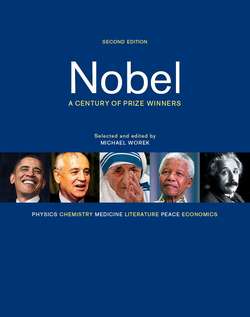Читать книгу Nobel - Michael Worek - Страница 58
На сайте Литреса книга снята с продажи.
ОглавлениеFridjtof Nansen (1861–1930)
1922 Peace
For activities in favor of peace and his role in the cause of refugees from war.
Although it was as a peace worker that Fridjtof Nansen earned his place in history, he was also a prominent naturalist and well known for his adventurous lifestyle. The son of a prosperous lawyer, he was born in the suburbs of Christiania (later renamed Oslo), in present-day Norway. He inherited strong moral principles from his father, but it was his mother, a strong-minded, athletic woman, who instilled in him a love of outdoor living and sports. As an adult, he was capable of impressive feats, including skiing more than 50 miles (80 km) in a day.
While he was a student, Nansen distinguished himself in the natural sciences and art. In 1881 he entered the University of Oslo to study zoology, hoping to prepare for a future that united all his interests. For the next 15 years he would, indeed, combine his athletic prowess, scientific interests, taste for adventure and drawing skills into a series of achievements that would bring him international fame.
In 1882 he boarded the ship Viking and sailed to the east coast of Greenland. Years later, his notes from the voyage were made into a book. But what stayed with him from that journey was a passion for the world of ice and sea. Among other feats and scientific studies, he crossed Greenland from end to end and was, at the time, the man to get closest to the North Pole.
In 1905 he interrupted his work to apply himself to the cause of separating Norway from Sweden. He returned to his scientific work, but with the outbreak of World War I he fully committed himself to international politics. Between 1917 and 1918, he headed a Norwegian mission to Washington and negotiated a relaxation of the blockade, which made maritime transport of essential food to his country possible. In 1919, he represented Norwegian interests in the constitution of the League of Nations and played an important role in the preparation of the Treaty of Versailles, contributing mostly to the recognition of smaller countries’ rights. He was the Norwegian delegate to the League until his death.
In the spring of 1920 Nansen led the process to repatriate prisoners of war, mostly being held in Russia. Despite a lack of funds and other difficulties, he managed to repatriate approximately 450,000 men in a year and a half. In 1921 he was nominated to direct the League of Nation’s High Commission for Refugees, and he created standards of procedure that are still followed to this day. That same year he led a food relief program for the millions of starving poor. It is estimated that Nasen’s program contributed to saving millions of people from starvation. His work with Greek and Armenian refugees was also important.
Fridjtof Nansen died on May 13, 1930. The funeral was delayed for four days so that he could be buried on the 17th, the day commemorating Norwegian independence.
